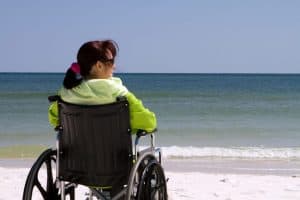
What Is Bronchiectasis?
Bronchiectasis, a serious lung condition that occurs when the walls of the airways (bronchi) thicken and mucus accumulates, often affects the entire body. The condition, which results from chronic inflammation and/or infection, typically occurs as part of a disease, such as HIV, COPD, TB, rheumatologic diseases, and cystic fibrosis.
Chronic lung conditions like bronchiectasis can become quite debilitating because the symptoms are so incapacitating. If you have severe bronchiectasis with frequent complications or exacerbations, you might be able to collect Social Security disability benefits. For a free case evaluation with a disability lawyer to see if you might qualify for Social Security disability for bronchiectasis in Pittsburgh, call Berger and Green at 412-424-6079.
40+ years of experience from strong, knowledgeable, compassionate attorneys.
Start A Free EvaluationWhen does the SSA consider bronchiectasis as a disability?
The Social Security Administration (SSA) maintains a Listing of Impairments in its Blue Book. The listed impairments are conditions that, when they meet the severity requirements, the SSA considers disabling. In other words, if you meet the criteria of a listing, the SSA will accept that you are disabled.
Bronchiectasis is one of the listed conditions, detailed in Section 3.00 of the Blue Book. There are two listings the SSA can evaluate you under:
3.07: Bronchiectasis
“If you are having exacerbations or complications (e.g., acute bacterial infections, increased shortness of breath, or coughing up blood) that require hospitalization”, the SSA will evaluate you under 3.07.
The guidelines stipulate that for the SSA to approve you under this listing, you must have had exacerbations or complications requiring three hospitalizations within a 12-month period and at least 30 days apart, and each hospitalization must have lasted at least 48 hours.
3.02: Chronic respiratory disorders
The SSA can also evaluate you under 3.02, which applies to various types of debilitating breathing conditions. For the SSA to deem you disabled under this listing, your medical records must show that your breathing is severely impaired, as measured by your FEV1, FVC, DLCO measurements, arterial PaO2 and PaCO2 levels, or your SpO2 levels.
We know you’re hurting. We can help. Free case evaluations, home and hospital visits.
Contact Us Now For HelpWhat if I do not meet the criteria?
If you do not meet the above criteria, you may still be able to qualify as disabled via another route. For instance, if you have another condition also listed in the Blue Book, such as HIV or CF, the SSA can evaluate you under those listings, as well.
If you do not meet the exact requirements under any listing, the SSA will then determine what your RFC or residual functional capacity is. Your RFC rating indicates what kinds of job-related tasks that you can still do, despite your condition. If the SSA finds that, there is no job you can do, then it may still deem you disabled.
You need an attorney with the experience and dedication to give your case the care it deserves.
Start A Free EvaluationAre there any other requirements I need to meet to collect disability benefits?
When the SSA evaluates your disability claim, the claims examiner will check to see if you meet the following basic three requirements:
- You have an impairment that meets the SSA’s definition of disabled.
- Your condition has lasted or is expected to last a year or more or result in death.
- You meet either the financial requirements (for Supplemental Security Income applicants) or work credit requirements (for Social Security Disability Insurance applicants).
Supplemental Security Income or SSI, is a disability benefit for children and for adults with limited income and resources and limited work history. Your income must be below $733 for an individual and you must have less than $2,000 in assets. (Calculating income and assets for the purposes of SSI is complex though, because the SSA exempts a good bit of your money and belongings.)
Social Security Disability Insurance or SSDI, is a program for disabled workers who have adequately paid into the Social Security system. The amount of work credits you need depend on your age.
We can examine your medical, work, and financial records to determine which type of benefit you might qualify for.
We can address all the legal hurdles that may be keeping you from getting a fair settlement.
Speak To An Attorney TodayHow do I prove my disability based on bronchiectasis to the SSA?
You must prove your bronchiectasis with imaging tests such as x-rays and CT scans. The SSA will want to see all your medical records associated with your condition and complications, including your files from your general doctor, your specialists, and the hospital.
Your records should include your diagnosis, results from your breathing tests, treatments you have undergone, how you responded to the treatments, and your prognosis. The more detailed input your doctor can provide about your condition and your limitations, the better.
The claims examiner will also review non-medical evidence you submit, such as letters from you and your family members, employer, co-workers, etc. that explain how your bronchiectasis limits your ability to function.
Without sufficient evidence, the SSA will deny your claim. We can help you gather the necessary documents and ensure your forms and files are thorough and accurate.
Where can I get help with a disability claim?
If you recently received a letter in the mail from the SSA denying your benefits, contact Berger and Green straightaway. We can help you appeal your case, but we must act quickly because the SSA enforces a strict 60-day time limit.
Don’t feel too discouraged; over 70 percent of disability applications are initially denied. The SSA has very strict criteria and only awards benefits to those that are totally disabled. If you are entitled to benefits but your claim was denied or your benefits have been wrongly terminated, we can pursue your claim through several levels of appeals, if necessary.
For help with your case or for general questions about applying for disability benefits for your bronchiectasis, call our office in Pittsburgh at 412-661-1400 to schedule a free consultation.








